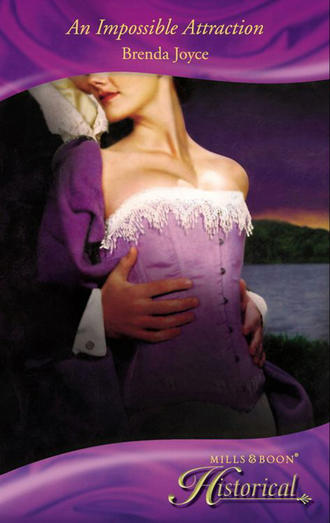
Полная версия
An Impossible Attraction
Not that he minded, and not that it mattered. Every man of honor had a duty, and his was Clarewood.
Stephen turned away, certain Jack had meant every word as far as the Indians and his hair went, and just as certain that he had cleverly manipulated Elysse. The crowd in the hall had been reduced, most of the guests now in the great ballroom, for which Harrington Hall was famous. He scanned the room but did not see the most recent object of his interest. But across the room, he saw the Sinclairs arriving. Lord Sinclair had recently angled for Stephen’s marriage to his very beautiful daughter. Young Anne was wedged between her parents, and she was so stunning that heads turned as they entered. His own blood did not race; instead, he had the urge to loosen his necktie. He hadn’t dismissed Sinclair outright; Anne had all the proper prerequisites—on paper, anyway—and he had said he would consider such a union.
She was only eighteen. She would be meek and eager to please; she would not have independent opinions; and she would make a stunning duchess.
“Why are you scowling?” Alexi asked.
“Am I frowning?” He smiled perfunctorily. He knew he would be bored with her before they ever got to the altar, and that was the end of that.
“Who is that? Oh, wait, don’t bother—I know the answer.”
“Anne Sinclair. Her father suggested a marriage.”
“You will never get on.”
“Do not tell me how splendid constant bickering is.”
“I would die of boredom if Elysse obeyed my every command.”
“She disobeys your every command,” Stephen pointed out.
“And I am all the happier because of it.”
“And while I am thrilled you are so besotted, I should be incredibly unhappy if my wife disobeyed me.”
“Ah, yes, of course, Your Grace,” Alexi said. He shook his head in disgust and lowered his voice. “You can pretend you are like the old man, but you are not. And we both know you will never get on in a dull, arranged marriage—which is why you have avoided matrimony for almost fifteen years.”
Stephen was oddly annoyed, and they were once again at a stand-off. “I’ll see you at the Stag later. I pray we can discuss your affairs, not mine.”
“Coward.”
Only Alexi de Warenne could get away with such an insolent statement. Stephen decided to ignore him and strode off into the crowd. He had better things to do—and an acquaintance to pursue.
SARA HAD BEEN THRONGED with guests and admirers since she’d arrived. Stephen smiled, studying his half sister from a slight distance. She had never seemed so happy, and he was at once glad and proud. She was a very pretty girl, taking after her mother in both appearance and temperament; she was kind, shy and gentle. While he’d known her since she was an infant—she had been born shortly before he’d inherited the duchy—he hadn’t spent as much time with her or Marion as he would have liked, due to the constraints of the situation. While most of the sprawling de Warenne family knew the truth about him, his half sisters had been told the exact nature of their relationship only two years ago. After all, children did not keep secrets well. Until that time, they had thought him a dear family friend.
He was aware that she was shy with him, as if he were an older relative who did not visit all that often. He also knew she was in some awe of him, and he wished somewhat wistfully that he could have been a brother to her openly, but that was simply impossible.
She was shining tonight, as she should be on her sixteenth birthday. As he watched several young men flirting with her, he felt a stirring of pride and protectiveness. He would always be her protector, even if from a distance.
He quietly awaited his turn to greet her, but the men and women in front of him realized who was standing behind them and allowed him to cut to the head of the queue. She was blushing profusely as Lord Montclair, who was far too old for her, congratulated her, and Stephen paused to smile at Lady Harrington.
“How are you, Your Grace?” Blanche Harrington asked, clasping both his hands warmly.
Blanche had been warm and kind to him from the moment of their first meeting, when he was nine years old. He liked her greatly in return, and understood that she had embraced him so genuinely because of her deep love for Sir Rex. “I am enjoying the evening, and apparently so is Sara.”
“The truth is,” Blanche said softly, “Sara was dreading this evening. You know how modest she is. She was afraid she would fail her guests. But she has been having a fabulous time.”
He glanced at Sara, wondering how more confidence might be instilled in her. Sara saw him, and she instantly stepped forward, blushing. “Your Grace,” she whispered.
Long ago, he had decided that having his half siblings address him formally was not awkward—just a necessity. He took her hands and said, “Congratulations, my dear. You are so lovely tonight, and I believe your ball is a great success.”
“Thank you, Your Grace.” She smiled shyly. “I’m so glad you could come tonight.”
“I would never miss your birthday. In fact, your present is on the gift table in the front hall, and I hope you will enjoy it.”
“I will treasure it,” she said seriously. “Because it is from you.”
He took her hand and kissed it. He had given her a diamond pendant necklace, and he hoped she would treasure it forever. But before he could straighten, he had a vision of Tom Mowbray standing behind her.
It was just for a moment, but the old man was mocking his sentiments, as if he thought him a fool.
Stephen tensed. Even though Tom was gone and what he’d seen had been a memory, not a ghost, he could hear him as clearly as if he still lived. Your duty is Clarewood—not a half sibling! And you dare to yearn for more?
But he wasn’t yearning for anything. He was merely fond of his sister—and that was as much his duty as anything else.
Sir Rex detached himself from a group of guests and turned to face him. Stephen knew he was fortunate that his natural father was a man of such honor, and they had developed a friendship over the years. “Will Sara shriek and swoon when she sees your gift? I hope it was within reason,” Sir Rex said, as they shook hands. “How are you, Stephen?”
Sir Rex refused to address him as Your Grace, and while it was odd, no one seemed to care, or perhaps society had simply become used to it. Stephen thought that he would hate being so formally addressed by the man who had not only sired him, but had had his best interests at heart for as long as he could remember. He had respected and even admired Sir Rex for years, before learning the truth about their relationship, while Sir Rex had always been more than usually kind and attentive to him. In retrospect, he understood why. “I am very well, and currently preoccupied with the Manchester housing project, amongst other things.” He was building housing for textile workers, housing with proper lighting, ventilation and sewage disposal. The factory owners were not pleased, but he did not care; they would come around when they realized that healthy workers were far more productive than ill ones.
“Are the plans finalized?” Sir Rex asked with interest. He had been a huge supporter of all of Stephen’s good works.
“No, they are not. But I was hoping to show them to you when they are done.”
Sir Rex smiled, pleased. “I have not a doubt the plans will be a triumph, and I can hardly wait to see them.”
Sir Rex was as different from Tom Mowbray as a man could be. He believed in praise and encouragement, not criticism and scorn. Stephen knew that he should be accustomed to such praise, but he was not. He was always vaguely surprised and a bit uncomfortable, and always warmed. “There might be several go-rounds,” he said. “There are some issues still to resolve.”
“You will resolve them—you always do. I am confident,” Sir Rex said, smiling.
“Thank you. I am hopeful your confidence will not be misplaced.” As he spoke, he saw Randolph, Sir Rex’s son—his own half brother—enter the ballroom. Randolph instantly saw them, and he grinned, starting toward them.
“I am glad you are mentoring Randolph,” Sir Rex said. “He has done nothing but speak of your good works since returning from Dublin.”
“Randolph is determined, and he is very intelligent. He discovered some discrepancies in the Clarewood Home’s Dublin accounts. I have had to replace the director there.”
“He told me. He is astonishingly adept with numbers. He does not get that from me.”
Randolph was not yet twenty, but he was tawny and handsome, resembling his father almost exactly, except for his golden coloring. He had tremendous confidence, present in his long, assured stride—and the many younger debutantes present were all ogling him as he passed by. He grinned as he paused beside them. “Hello, Father…Your Grace.”
“You are late,” Stephen said mildly. Randolph was flushed and very, very smug, and Stephen damned well knew what he’d been up to.
“You are not the only one who has rescued a damsel in distress tonight,” Randolph boasted.
“You will catch a dreadful disease,” Stephen warned, meaning it. “And one must never discuss indiscretion openly.”
Some of Randolph’s exhilaration faded. “I did not mean to be late. The time somehow escaped me.” But then he snickered again.
“Of course you did not mean to be late. You weren’t thinking clearly—I doubt you were thinking at all. It is Sara’s birthday, Randolph.” He hoped he was not being too harsh, but Randolph was too often reckless, and that worried him.
The boy flushed now. “I will apologize to Sara.” He glanced at his sister, and his eyes widened. “You have turned into a beauty!” he exclaimed.
Stephen was amused, and he saw that Sir Rex was, too. As Randolph hurried over to his sister, Sir Rex said, “I have spoken to him many times, but I am afraid my advice falls on deaf—though young—ears.”
“He has assured me that he is careful and discreet,” Stephen said.
“Thank you.” Sir Rex sighed. “I cannot recall a male de Warenne who was not notorious for his philandering until the time he was wed.” And Sir Rex gave him a look.
“Well, then Randolph is following in the family tradition,” Stephen remarked. But he turned away, uncomfortable, wondering if he was included in the generalization. In a way, he hoped not. He considered his amorous liaisons rather routine, for a bachelor like himself.
Suddenly Stephen saw Edgemont hurrying through the crowd, and he quickly realized that the man was staggering drunk. He glanced around with some concern, but Miss Bolton was nowhere in sight. That was when he saw the dowager duchess entering the ballroom, and she was not alone.
The fact that his mother would be escorted to such an affair was hardly unusual, but he instantly saw that this was not a routine matter. The man on her arm was tall and golden, with a presence that was positively leonine. And his mother, he realized, was radiant—as if deliriously happy. In fact, she had never looked better.
Julia Mowbray, the Dowager Duchess of Clarewood, was one of the strongest and most courageous women he knew. She had devoted her entire life to the cause of advancing his interests, at great personal cost and sacrifice. She had suffered greatly at the previous duke’s hands. A dowager for fifteen years, she had decided not to remarry, and he had applauded that decision. Now, he was concerned.
“Who is accompanying the dowager duchess tonight?” he asked sharply.
“I believe that his name is Tyne Jefferson, and that he is a rancher from California.”
“Are you certain?” Was his mother romantically interested in Jefferson? “Is he wealthy? Does he come from a good family? He looks rather savage.”
“You should calm down. Julia is a strong and sensible woman. Fortune hunters have been sniffing about her for years, and she has eluded every single one of them.”
“So you think he is a fortune hunter!” Stephen exclaimed.
“No, I do not. I have heard that he has some business with your uncle, Cliff.”
“I believe introductions are in order,” Stephen said. The dowager duchess was a very wealthy woman—and she was his responsibility. He did not care for this liaison. He was worried. “Excuse me.”
Julia was strolling across the ballroom with the American. The consummate diplomat now, as she had once been the consummate duchess, she paused before each party, making certain to politely introduce Jefferson, who looked to Stephen to be unperturbed by the entire affair. He barely spoke, but he watched Julia closely, with obvious interest. Stephen approached them from behind.
Jefferson sensed him immediately and turned. Stephen smiled coolly at him. As he discerned a challenge, Jefferson’s gaze narrowed.
Julia whirled. “Stephen!” She took his hands and kissed his cheek. “I am so glad you are here. This is Mr. Tyne Jefferson, and this is my son, His Grace, the Duke of Clarewood.”
“I am honored, Your Grace,” Jefferson drawled. But Stephen knew from the American’s tone that the man was not awed by him, or even impressed. “Mr. Jefferson. And are you enjoying my country?” Stephen returned, smiling. He gestured at the lavish room. “I imagine you do not attend many balls in California.”
Julia stepped closer to Stephen and sent him a look that said very clearly that she was becoming angry with him.
It didn’t matter. He had to protect her from disaster and heartache, at all costs.
“No, we don’t have balls like this in California. The scenery here is quite a welcome change, as well.” Suddenly Jefferson looked at Julia, the gaze direct, and she flushed.
Stephen was briefly shocked—and uncharacteristically speechless—by how obvious her feelings were for this man.
“I am enjoying my stay here,” Jefferson added. “And I very much appreciate being invited to attend this ball.”
Julia smiled at him. “It would have been remiss of me, sir, not to invite you to join me.”
Stephen glanced sharply at her. What was she thinking? He turned back to Jefferson. “And what brings you to Britain?”
The American seemed amused. “A personal matter, actually.”
He had just been told to mind his own affairs, and he was not pleased about it. “Sir Rex told me that you have some business with Cliff de Warenne.” His uncle—Alexi’s father—had built up a global shipping empire over the years.
“Stephen,” Julia said swiftly. “I know you wish to become further acquainted with Mr. Jefferson, but we have only just arrived. There are still a number of introductions I wish to make.” She was firm.
Stephen knew he must stand down—for now. But he would begin an investigation of the man, and tomorrow, first thing, he would summon Julia to Clarewood to find out what she was doing by promoting an acquaintance with such a man. “Perhaps I can be of some help in your business affairs, for not only am I on good terms with the de Warenne family, I am well connected throughout the realm.”
“Nice of you to offer,” Jefferson said, mockery in his tone but his expression as cool as a cube of ice. “And I’ll definitely think about it.”
Julia gave him another warning look, but Stephen barely saw it. He wasn’t sure he had ever encountered such arrogance, and in spite of himself, he felt the dawning of a grudging respect for the American.
“HERE, A SIP OF TEA will undoubtedly help,” Squire Denney said with concern.
Alexandra smiled gratefully at him, aware that she was still being stared at and, at times, whispered about. She had not dreamed of such a reception to her first social event in nine years. No one had spoken with her since they had arrived at Sara’s birthday party other than her sisters, her father and the squire. She had done her best to pretend that all was well—she did not want to distress the squire or, worse, chase him off. But surely, once he realized what was happening and what society thought of her, he would flee.
They’d been at Harrington Hall for about two hours, and her headache was so bad now that she’d finally confessed to feeling a bit under the weather. Denney was being kind. She had the feeling that compassion was a large part of his nature. “Thank you,” she said, accepting the tea and knowing he’d gone out of his way to find a hot cup at this hour.
She took a sip. She felt as if she had been standing in that corner of the ballroom forever, but it was only nine o’clock. She wasn’t sure she had ever felt so humiliated. She couldn’t believe she’d been so naive as to think she could appear in society when she made a living as a seamstress now. As for the vicious gossip that she’d been jilted by Owen, she couldn’t bear to think about it. At least she could console herself with the truth. Even so, surely the squire would decide that he wanted a socially acceptable wife, ruling her out.
She glanced at her sisters, dismayed. They should have been out on the dance floor; instead, they refused to leave her side. They should have been having the best time of their young lives; instead, they were anxious and frightened, and determined to defend her from further slander and prevent another disaster.
Her glance wandered. And she knew she was looking for him.
Her heart thundered. Her cheeks felt hot.
“I will get you a small bite,” Denney said, his concern as vast as ever.
Realizing he would leave her side for a moment, and that she might speak privately to her sisters, Alexandra nodded. “Thank you.”
When he was gone, Corey whispered, “I think we should leave.” She was pale with distress.
Alexandra faced her, a firm smile in place. “We will not cry over spilt milk, we will merely clean it up.”
“These people are hateful,” Corey continued in a whisper. “Who cares about being at this party?”
“Everyone is not hateful. A handful of these women are mean-spirited, that is all. Wasn’t it nice to see Lady Harrington and her daughters again?” Blanche Harrington had been kind and concerned, and her daughters had actually seemed pleased to renew their acquaintances. Sir Rex had been equally magnanimous. “And, Corey, you remain the interest of several young gentlemen here.”
“I don’t care,” Corey said, meaning it. “When can we leave?”
Alexandra exchanged a glance with Olivia and caught her staring at the same blond man she herself had noticed earlier. Her heart clenched. Whoever that gentleman was, he was not for her sister. “Who is that?”
Olivia flushed. “I don’t know. I overheard someone saying he’s been in the wilds of America for the past two years.”
Alexandra sensed her sister’s interest, and she took her hand and squeezed it sadly. Then she looked at Corey. “We can’t leave this early. That would be grossly insulting to our hosts. And it would be rude to the squire, as well.”
Corey was grim. “I know,” she said. “But one can hope, can’t one?”
“I think we should try to resurrect this evening—and enjoy the next few hours,” Alexandra said.
Her sisters did not buy her optimism for a moment. Olivia said, “Where is Father?”
Alexandra froze. She hadn’t seen him in an hour, and no good could come of that. If he was drinking, she would wring his neck when they got home, and this time she meant it. She could not bear any more disgrace. “Maybe we should look for him,” she said, setting down her cup of tea.
Olivia pinched her—hard.
As she did, Alexandra felt his stare. She inhaled hard, tensing. The sensation of being watched by the Duke of Clarewood was unlike any other. And slowly she turned.
It remained unbelievable that she had almost fainted and that he’d caught her before she collapsed. It remained as impossible that he’d been gallant—and that he had even flirted with her. Just as impossible was the fact that a moment later she had caught him staring closely at her, as he was doing now. Their gazes locked.
Her heart leaped, lurched and then raced wildly.
She could not quite breathe.
He was speaking with several gentlemen, but his gaze was most definitely on her, at once confident and intense. Alexandra knew she would never forget the feeling of being in his strong arms. As for his interest, she was fairly certain she knew what it signified.
He was unwed, and so was she—but she was not in his league. She was too old for him, too impoverished, the family name too disreputable. His interest could mean only one thing.
She was stunned, but also dismayed.
“That is Clarewood,” Corey breathed, clearly in awe and, just as clearly, having no comprehension of the situation.
“I am in his debt,” Alexandra said tersely. She glanced at Olivia, who stared back. Surely Olivia understood that he would never be interested in her in any honorable way. And she still couldn’t fathom his interest, not even in any dishonorable way. Why did he find her interesting? There were many beautiful women in the room. And then, from the corner of her eye, she saw their father heading toward them.
She froze. He was lurching. She had prayed things would not get worse, but clearly her prayers had gone unanswered.
Olivia saw him, too, and she gasped. Then, “Now we have to leave.”
There was nothing Alexandra wished to do more. However, running now, with their tails between their legs, would leave a terrible impression. “The two of you stay here. I am sending him home, and I’ll be back in a moment.”
Olivia’s regard was imploring. “Why?”
“I don’t think Denney has noticed how foxed Father is. And we are staying until the squire is ready to leave—we are his guests.”
Edgemont swayed toward her, grinning. “My beautiful daughter! Are you enjoying yourself?”
She took his arm, moving him into the corner. “You promised not to imbibe.”
“I haven’t. Alexandra, I swear. Not one drop.”
“You reek of whiskey, and you’re staggering,” she accused. She was livid, but even more, she was humiliated and dismayed.
“I did not take even one drop of whiskey,” he slurred. “’Twas gin.”
“And that makes it better?” She looped her arm firmly through his, but even so, he almost fell on her. She hit the wall, flushing, his weight too heavy for her to bear. “You have to leave, Father. You cannot remain in such a state.”
“Too shoon to go, my dear. There’sh cards in the game room.” He tried to push her away and almost fell again.
Alexandra knew that they were being remarked. She seized his arm and tried to get him to stand upright. As he stood up, swaying, she did not know if she would ever forgive him for this.
“You’re having a good time, aren’t you?” he asked, grinning.
“Yes, I am having a splendid time,” she snapped, wondering if she should try to drag him bodily from the room. She did not think she was strong enough to do so.
“Good.” He suddenly pulled free of her and crashed into the wall himself. “Whoops.”
Furious, her cheeks on fire, Alexandra seized his arm and threw it over her shoulders. “We are leaving,” she said, trying to speak as calmly as possible, no easy task when she was furious.
“Don’t want to go,” he said, balking. “Cardsh.”
She looked at him, and when he smiled back at her, she wanted to cry. So this was how he was once he left the house every night? It was simply heartbreaking. And the most heartbreaking part was that she was certain that, had her mother lived, his propensity for alcohol would have never become so out of control.
“May I?” the Duke of Clarewood asked.
She went still. Then, her father’s weight half on her, his arm over her shoulders, her hair now coming down in absolute disarray, she looked up.
His brilliantly blue gaze met hers. There was no scorn on his handsome face, no condescension. He seemed suitably grave, and in that moment he seemed like the Rock of Gibraltar.
Alexandra felt her heart explode. “I beg your pardon?”
“May I be of some assistance?” He sent her a dazzling smile.
It was the kind of smile no woman could resist. Alexandra felt like dumping her drunken father in his arms and bursting into tears. Instead, she jerked her father’s arm more tightly over her shoulders, held her head high and blinked back any rising moisture. Even as she did so, she knew she couldn’t possibly carry him out of the room, much less the house.









